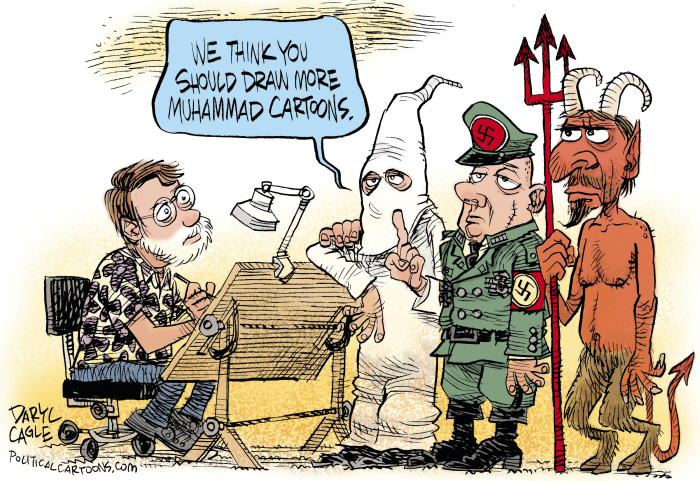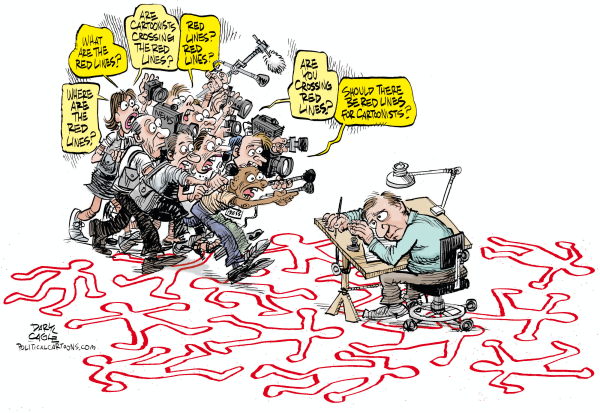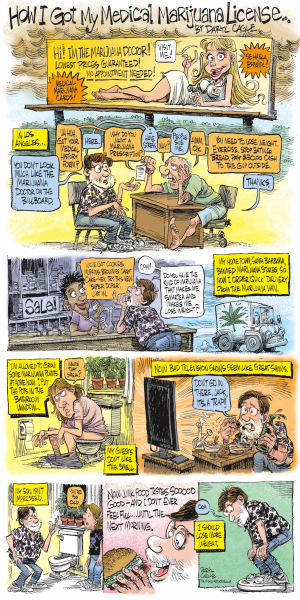
Last week The New York Times ran one of my cartoons. The cartoon showed three kids on a couch with their laptops and iPods, one says, “Check out Saddam hanging. Ouch. That’s gotta hurt.” The next one says, “He’s so dead.” The third one says, “Let’s look again at Britney Spears with no underwear.” The caption reads, “The death of newspapers.” It is a cartoon that plays well with newspaper editors who are obsessed with the crass, unedited Internet that is destroying their business.
The Times ran my cartoon in their weekly round-up of editorial cartoons where they edit the cartoons to remove the artist’s signature and attribution. Typically, the Times will print the artist’s name and attribution alongside the cartoon, as with the two cartoons above mine where the artist, his newspaper and syndicate are credited. But in my case, only my name is given, no credit is given to MSNBC.com, my publication of record, which was erased from my cartoon and omitted from my attribution.
Although it is traditional for a cartoonist to sign his work and include his publication name in his signature, some newspapers object to any mention of a Web site in a cartoon, or in a syndicated column; the concern is that mentioning a Web site is like giving the cartoonist or writer a free advertisement. The Times wouldn’t be concerned about their readers picking up a copy of The Columbus Dispatch, so an advertisement for another newspaper doesn’t carry much value, but a mention of MSNBC.com might send readers to a serious competitor. This is ironic, given the subject matter of my cartoon. By itself, the cartoon is funny, but suggesting that the cartoon came from a Web site – particularly MSNBC.com, whose audience dwarfs the New York Times – that might just be too painful for the Times to acknowledge.
The Times calls their weekly cartoon round-up “Laugh Lines,” a title that doesn’t sit well with editorial cartoonists who consider themselves to be graphic columnists. Like columnists, cartoonists are sometimes funny; sometimes we want the reader to wince; sometimes we want to bring a tear to the eye. Some of the most famous cartoons are serious cartoons. We all drew the Statue of Liberty weeping after 9/11. Bill Mauldin famously drew the statue of Lincoln weeping after the assassination of President Kennedy. But don’t expect to see a poignant cartoon running in The New York Times under the title “Laugh Lines.” Many cartoonists decry the trivialization of our profession by editors who choose to reprint cartoons that are soft little jokes. Serious cartoons are not so popular with timid editors who want to avoid offending anyone. We call this phenomenon “Newsweekification” because of the funny, inoffensive, trivial cartoons that Newsweek chooses to run each week – just like the Times. The secret to becoming a popular editorial cartoonist is to be funny and not express an opinion.
The New York Times reprints syndicated cartoons on Sundays, but hasn’t had its own editorial cartoonist since the 1950s. More and more newspapers are doing without staff cartoonists as our profession slowly dies. Top newspapers without cartoonists include the Wall Street Journal, Los Angeles Times, USA Today and the Chicago Tribune. There are two famous quotes, attributed to “the editor of The New York Times,” (although I’m not quite sure just who actually said these). The first is: “We would never have an editorial cartoonist at the Times because we would never give so much power to one man.” The second quote: “We would never have an editorial cartoonist at the Times because you can’t edit a cartoonist like you can a columnist.” (He must have forgotten about how the Times edits the signatures and attributions of out the cartoons.)
A number of cartoonists e-mailed me this week with the same question, “Hey, Daryl, I saw your cartoon in the Times, how do I get my own cartoons in the Times?” I regret that the reality behind the big-time political cartooning business is a little disappointing. Here’s how it works: dozens of cartoonists around the world e-mail their cartoons to the Times and other “pay-per-use” newspapers who accept unsolicited submissions. It is the same thing with USA Today, send it in and if they run it, they pay $50 – but the Times is a little different. Instead of just paying $50, the Times doesn’t pay unless the cartoonist notices that they ran the cartoon and sends them an invoice. The Times doesn’t tell the cartoonist that they ran the cartoon and if they don’t receive an invoice, the Times saves the $50.
Suppose The New York Times dealt with McDonalds the same way they deal with cartoonists. The Times would say:
“Hey, McDonalds, I want you to deliver a hamburger to me every day; I may choose to eat it, and I may not. If I choose to eat the burger, I will pay you for it. If I don’t eat the burger, I won’t pay you. I’m not going to tell you if I eat a burger or not. If you want to get paid, you’ll have to see me eating the burger and then send me a bill, and the bill must tell me when you saw me eating the burger. I understand that you’ll have to watch me all the time to see if I’m eating one of your burgers, but that shouldn’t be a problem, because I’m very big and very interesting, and I expect you to be watching me all the time anyway. If you’re lucky, I might eat one or two of your burgers every year.”
There are about one thousand aspiring cartoonists for every one who actually makes a living as a professional editorial cartoonist. I’m sure that if the “wanna-be” cartoonists would actually look inside the editorial-cartoon-burger, to see how it is made, it would give them a belly ache – a $50, New York Times-sized belly ache.
Daryl Cagle is a political cartoonist and blogger for MSNBC.com. He is a past president of the National Cartoonists Society and his cartoons are syndicated to more than 800 newspapers, including the paper you are reading. His books “The BIG Book of Bush Cartoons” and “The Best Political Cartoons of the Year, 2005, 2006 and 2007 Editions,” are available in bookstores now. Copyright 2007 Cagle Cartoons Inc. Please contact Sales at [email protected] for reproduction rights.
















